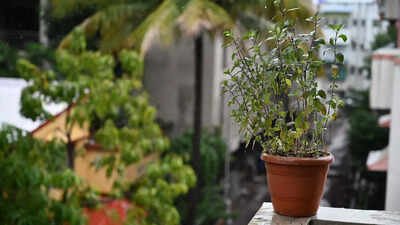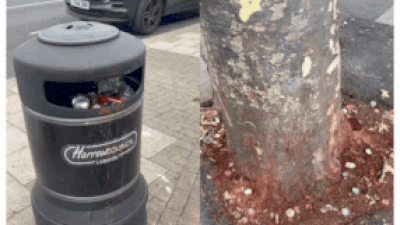Why every home needs a tulsi plant: 9 powerful health and spiritual benefits |

Tulsi, or Holy Basil, is much more than just a sacred plant in Indian culture; it’s a powerful natural ally for your health, home, and spiritual wellbeing. Whether grown in a courtyard, balcony, or windowsill, Tulsi offers an impressive array of benefits, from boosting immunity and easing stress to purifying indoor air and supporting digestion. Its presence is not only calming but also symbolic of positive energy and balance. According to studies and Ayurveda, this easy-to-grow herb deserves a place in every household. Discover why adding a Tulsi plant to your home can be a simple yet transformative step towards holistic wellness.
9 Powerful reasons to grow a tulsi plant at home
Reduces stress and calms the mind
Tulsi is classified as an adaptogen, which means it helps your body manage and adapt to stress. The natural compounds found in tulsi leaves help regulate cortisol, the hormone responsible for stress. Simply spending time near the plant, inhaling its subtle aroma, or sipping Tulsi tea can have a calming effect on your nervous system. Many people report feeling more relaxed and mentally clear when they incorporate tulsi into their daily routine.
Enhances immunity and natural defences
Tulsi is widely known for its immunity-boosting properties. It contains phytochemicals like eugenol, ursolic acid, and rosmarinic acid that help strengthen the body’s ability to fight off pathogens. Drinking tulsi-infused water or chewing its fresh leaves can help your body stay protected against seasonal infections, colds, and flu. It’s a natural way to support your immune system without relying solely on supplements.
Supports heart health and metabolic balance
Regular use of tulsi is believed to contribute to a healthy heart. It may help lower blood pressure, improve blood circulation, and reduce bad cholesterol (LDL) while increasing good cholesterol (HDL). Additionally, Tulsi helps stabilise blood sugar levels, which is beneficial for people managing diabetes or insulin resistance. Including tulsi in your diet or daily herbal routine can support better cardiovascular and metabolic health over time.
Improves respiratory health
Tulsi has long been used in traditional remedies for coughs, asthma, and other respiratory issues. The plant’s anti-inflammatory and antimicrobial properties can help reduce congestion, ease sore throats, and open up the airways. Boiling tulsi leaves in water to make a warm tea or using the leaves for steam inhalation can provide quick relief from cold symptoms and support overall lung function.
Aids digestion and detoxification
If you struggle with digestive issues like gas, bloating, or acidity, tulsi can be a gentle yet effective solution. It stimulates the production of digestive enzymes and reduces inflammation in the gut lining. Tulsi also helps flush out toxins from the body and supports liver health, which is crucial for natural detoxification. Drinking tulsi water or tea after meals can promote smoother digestion and reduce discomfort.
Purifies indoor air and repels insects
Tulsi acts as a natural air purifier. It emits oxygen and absorbs harmful gases such as carbon dioxide and pollutants, especially in urban environments. Additionally, the aroma of Tulsi helps repel mosquitoes and other insects, making it a great choice for placing near doors, windows, or patios. Growing tulsi indoors not only enhances the air quality but also creates a fresh and uplifting environment.
Creates a calming spiritual atmosphere
In many Indian households, Tulsi is worshipped daily for its spiritual importance. It is believed to bring peace, harmony, and prosperity to the home. Placing a Tulsi plant in a central courtyard, near an altar, or at the entrance is thought to cleanse the energy of the space and attract positivity. Lighting a diya near the plant during early morning or evening prayers is a common ritual that promotes mindfulness and connection.
Promotes healthy skin and oral care
Tulsi’s antibacterial and anti-inflammatory qualities also benefit the skin. It can help treat acne, skin rashes, and minor infections when applied topically or consumed regularly. Some people even add tulsi extracts to homemade face masks or cleansers. Additionally, chewing tulsi leaves or using them in mouth rinses can improve oral hygiene by reducing bacteria that cause plaque, bad breath, or gum issues.
Rich in essential nutrients
Tulsi contains vital nutrients, including vitamins A and C, calcium, zinc, and iron. These nutrients support your immune system, bone health, skin clarity, and energy levels. Even in small amounts, the regular intake of tulsi can be a nutritious addition to your daily diet and wellness regimen.Growing a Tulsi plant at home goes far beyond tradition; it’s a practical, therapeutic, and holistic choice for modern living. From boosting your immunity and purifying the air to reducing stress and enhancing spirituality, tulsi is truly a plant that nurtures the body, mind, and soul. With minimal care, it flourishes year-round and brings a wealth of benefits to your home and family.Also Read: Why Amaranth is a must-have plant for every home gardener and how to grow it
var _mfq = window._mfq || [];
_mfq.push([“setVariable”, “toi_titan”, window.location.href]);
!(function(f, b, e, v, n, t, s) {
function loadFBEvents(isFBCampaignActive) {
if (!isFBCampaignActive) {
return;
}
(function(f, b, e, v, n, t, s) {
if (f.fbq) return;
n = f.fbq = function() {
n.callMethod ? n.callMethod(…arguments) : n.queue.push(arguments);
};
if (!f._fbq) f._fbq = n;
n.push = n;
n.loaded = !0;
n.version = ‘2.0’;
n.queue = [];
t = b.createElement(e);
t.async = !0;
t.defer = !0;
t.src = v;
s = b.getElementsByTagName(e)[0];
s.parentNode.insertBefore(t, s);
})(f, b, e, ‘https://connect.facebook.net/en_US/fbevents.js’, n, t, s);
fbq(‘init’, ‘593671331875494’);
fbq(‘track’, ‘PageView’);
};
function loadGtagEvents(isGoogleCampaignActive) {
if (!isGoogleCampaignActive) {
return;
}
var id = document.getElementById(‘toi-plus-google-campaign’);
if (id) {
return;
}
(function(f, b, e, v, n, t, s) {
t = b.createElement(e);
t.async = !0;
t.defer = !0;
t.src = v;
t.id = ‘toi-plus-google-campaign’;
s = b.getElementsByTagName(e)[0];
s.parentNode.insertBefore(t, s);
})(f, b, e, ‘https://www.googletagmanager.com/gtag/js?id=AW-877820074’, n, t, s);
};
function loadSurvicateJs(allowedSurvicateSections = []){
const section = window.location.pathname.split(‘/’)[1]
const isHomePageAllowed = window.location.pathname === ‘/’ && allowedSurvicateSections.includes(‘homepage’)
const ifAllowedOnAllPages = allowedSurvicateSections && allowedSurvicateSections.includes(‘all’);
if(allowedSurvicateSections.includes(section) || isHomePageAllowed || ifAllowedOnAllPages){
(function(w) {
function setAttributes() {
var prime_user_status = window.isPrime ? ‘paid’ : ‘free’ ;
var geoLocation = window?.geoinfo?.CountryCode ? window?.geoinfo?.CountryCode : ‘IN’ ;
w._sva.setVisitorTraits({
toi_user_subscription_status : prime_user_status,
toi_user_geolocation : geoLocation
});
}
if (w._sva && w._sva.setVisitorTraits) {
setAttributes();
} else {
w.addEventListener(“SurvicateReady”, setAttributes);
}
var s = document.createElement(‘script’);
s.src=”https://survey.survicate.com/workspaces/0be6ae9845d14a7c8ff08a7a00bd9b21/web_surveys.js”;
s.async = true;
var e = document.getElementsByTagName(‘script’)[0];
e.parentNode.insertBefore(s, e);
})(window);
}
}
window.TimesApps = window.TimesApps || {};
var TimesApps = window.TimesApps;
TimesApps.toiPlusEvents = function(config) {
var isConfigAvailable = “toiplus_site_settings” in f && “isFBCampaignActive” in f.toiplus_site_settings && “isGoogleCampaignActive” in f.toiplus_site_settings;
var isPrimeUser = window.isPrime;
var isPrimeUserLayout = window.isPrimeUserLayout;
if (isConfigAvailable && !isPrimeUser) {
loadGtagEvents(f.toiplus_site_settings.isGoogleCampaignActive);
loadFBEvents(f.toiplus_site_settings.isFBCampaignActive);
loadSurvicateJs(f.toiplus_site_settings.allowedSurvicateSections);
} else {
var JarvisUrl=”https://jarvis.indiatimes.com/v1/feeds/toi_plus/site_settings/643526e21443833f0c454615?db_env=published”;
window.getFromClient(JarvisUrl, function(config){
if (config) {
const allowedSectionSuricate = (isPrimeUserLayout) ? config?.allowedSurvicatePrimeSections : config?.allowedSurvicateSections
loadGtagEvents(config?.isGoogleCampaignActive);
loadFBEvents(config?.isFBCampaignActive);
loadSurvicateJs(allowedSectionSuricate);
}
})
}
};
})(
window,
document,
‘script’,
);
Source link




